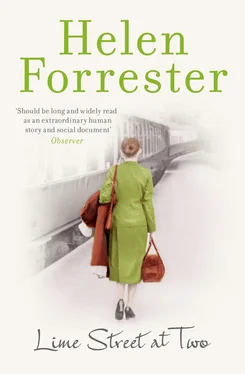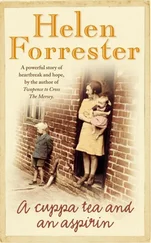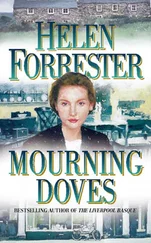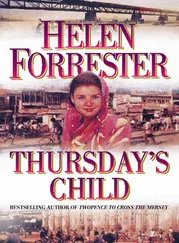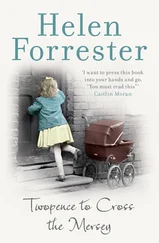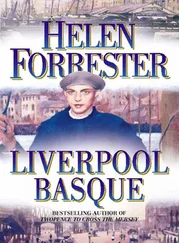She soon forgot her promise and fell into a series of tremendous rages, until I again gave up all my wages.
Fiona, three years younger than me, earned the same amount as I did, but the money was, in practice, left with her for her expenses and clothing, as was often done in middle-class families. She always looked well dressed.
Alan, the brother next to me in age, was in the Air Force. Out of the miserable fourteen shillings a week which he was paid, he allotted seven shillings to my mother. I felt that this, also, was pressing too hard on someone who had very little. I was unwise enough to say so, and Mother blew up like a time bomb.
‘It’s the only way in which I can claim a government pension, if he is killed,’ she stormed.
As far as I was concerned, this remark put her into the same cold-hearted category as Harry’s mother.
Before he was killed, Harry, my fiancé, had been on several voyages to New York, and at different times had brought me three very nice dresses from the Manhattan garment district. Anxious not to give an indication that I was engaged, I had told Mother that I had bought them in a second-hand store. Together with a pair of satin slippers, bought for my Confirmation and subsequently dyed black, the frocks enabled me to look appropriately dressed when I went to a local Dancing Club. Mother and Fiona often borrowed them. Since both of them were bigger than me, the seams were now showing signs of splitting.
Despite Mother’s ruthlessness, from the spring of 1940 I had endured my lot more philosophically. I would be twenty-one in June and would marry Harry in the summer, when he hoped to have earned enough to furnish his house with the essentials, so that we could move into it.
Now I was alone again and so distressed that I believe that sometimes I was out of my mind. I would cry as I walked home through the darkness, and often cried through the night, while Fiona slept contentedly on the other side of the bed, and poor little Avril aged twelve, squirmed uncomfortably between us.
One very hungry day, I inquired at the Employment Exchange about joining the Wrens, the naval service. I saw myself trim and smart in the navy-blue uniform and tricorn hat of an officer.
The clerk told me sharply that, with my qualifications, I might get into the ATS, the women’s service attached to the army; they needed kitchen help and drivers. I could not drive, and my present work demanded more skill than cooking for the Army, so I turned down this suggestion.
Feeling crushed and lonely, that evening I spent an extravagant shilling and went to the Dance Club, where I had first met Harry; I craved warm, friendly people round me.
Norm, the owner, had a new record of In the Mood on his wind-up gramophone, and over the cheerful noise of it, he greeted me genially.
At first those dancers who had known Harry and me were a little shy about asking me on to the floor. When they discovered that I was not going to weep for him on the padded shoulders of their best suits, I was never short of a partner. They were nearly all skilled workmen, for the moment exempt from military service; they were earning bigger wages than they had ever enjoyed before and had money to spend.
As a joke, I mimicked the pompous clerk in the Employment Exchange, who had so mortified me when I asked about joining the Wrens. A group of us were waiting for Norm to change the record, and the men gravely assured me that for a girl to join the Services was a fate worse than death.
With eyes averted, one man said, ‘It’s not suited to a nice girl like you. You’d have a rotten time.’
Another said with a grin, ‘Nice girls don’t leave home; they stay close to their mams.’ He nodded towards his friends, and added, ‘When these lads get into uniform it brings out their tomcat instincts; regular tigers, they are.’ He exchanged playful punches with the others, and the conversation became ribald, so I left them. Truly, I thought, there is no one so conservative, small c, as a skilled craftsman. I trusted them enough, however, to feel that I should keep on trying for work as a civilian.
One of Harry’s acquaintances escorted me home, and left me politely on my doorstep.
During that night, as I lay sleepless, I think I began to realise that I could not live my life alone, and that I hoped to meet someone a long time in the future, who would fill the frightful gap in my life. I was used to a large family round me. Homes were, indeed, more crowded in those days. Sometimes there was a grandparent or other relation living with a married couple with children, and a lodger or two; single men frequently rented a room and were boarded by their landlady, who sometimes became the target of malicious tongues. Elderly women, widowed or single, occasionally doubled up and also endured the disparaging remarks of their neighbours, in these cases, with regard to their sexual preferences. The concept of birth control was barely beginning to penetrate the densely populated area in which I lived; and in Bootle, a Roman Catholic district, it was almost unknown and, in consequence, families were huge.
If I could keep myself, I thought rather pitifully, one of my brothers, when they married, might allow me to live with him, if I were still single. At least then I would have some male protection. In the meantime, it was necessary for me to earn sufficient to satisfy my mother, and have enough left over to buy a decent lunch each day, pay tram fares, clothe myself and, if possible, put away something for my old age. I rarely dreamed of anything more, except to be able to go to a dance or to the theatre occasionally. The idea of holidays or of buying books, pictures or music never entered my head – they were untold luxuries.
During the following few weeks, kind, familiar faces began to vanish with alarming rapidity from the Dance Club. Though many members were exempt from military service, Ernest Bevin, the Minister of Labour and leader of the powerful Transport and General Workers’ Union, was re-directing skilled manpower to war production, often in other parts of the country. The men’s places on the dance floor were taken by soldiers from the nearby barracks, and they brought in women picked up from the streets. These new members of the Club were harder for the owners, Norm and Doris, to control; they were transients with no local reputation to maintain.
Very shortly after, a tight-lipped and disapproving Norm and Doris announced the closure of the Club. They would both go to work in a munition factory and would re-open their business after the war. Their dancing shoes were put away and they passed out of my life, two kind people who believed in a certain standard of conduct and refused to deviate from it.
It was only when I saw the hastily scrawled note pinned on the dusty black door, Closed for the duration , that I realised how much I had depended upon the Club for company. Because it was so late before I got home from work, it had been my sole source of social life, except for occasional visits to the Playhouse theatre with a friend called Sylvia Poole.
After reading the note, I stood looking up at the door with its blistered paint and soot-covered portico, and I felt again, for a moment, the same scarifying loneliness of my first days in Liverpool as a child of eleven.
A savage air raid was in progress, but, despite the whistling bombs, I had, on my way home from work, crossed the double width of the parallel boulevards of Princes Road and Princes Avenue, to look once more at the old house where I had first met Harry. It had brought me such intense, though short-lived happiness. A greenish flare, dropped by a German bomber, lit up every detail of its simple, graceful architecture and gave it an almost dreamlike air.
‘Goodbye, youth. Goodbye, happiness,’ I muttered bitterly, as amid hissing flak, I crossed back over the road and the avenue, and went home to face the inner loneliness, the sense of being lost, which is the lot of the bereaved.
Читать дальше
